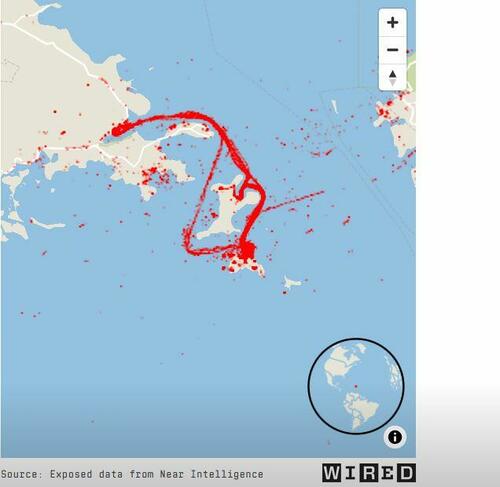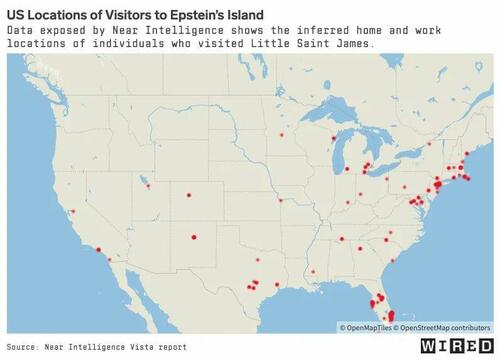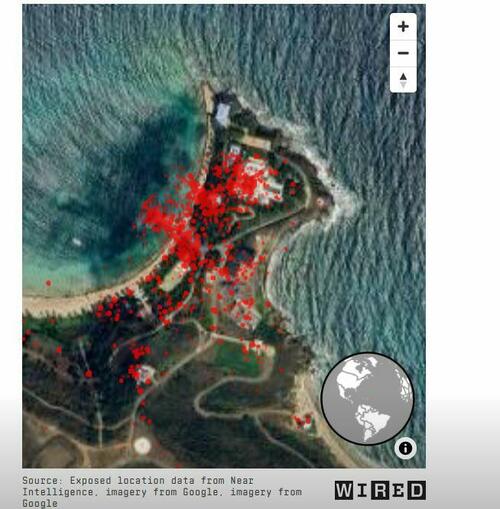Data from nearly 200 mobile devices reveal the exact path taken by visitors to Jeffrey Epstein’s notorious ‘pedo island,’ which was tracked to 80 cities around the world spanning 26 states or territories.
The data, obtained by Wired, came from recently bankrupt company Near Intelligence, which allegedly traced the phones which went to and from Little Saint James island, where Epstein allegedly ran an underage sex trafficking network.
Near Intelligence, which rebranded itself Azira amid an internal fraud scandal and other controversies, mapped out more than 11,000 coordinates from 166 locations. Some of the locations point to gated communities in Michigan, Florida, as well as homes in Martha’s Vineyard and Nantuckett and a nightclub in Miami, according to the report.
The coordinates that Near Intelligence collected and left exposed online pinpoint locations to within a few centimeters of space. Visitors were tracked as they moved from the Ritz-Carlton on neighboring St. Thomas Island, for instance, to a specific dock at the American Yacht Harbor—a marina once co-owned by Epstein that hosts an “impressive array” of pleasure boats and mega-yachts. The data pinpointed their movements as they were transported to Epstein’s dock on Little St. James, revealing the exact routes taken to the island. – Wired
The tracking data, which dates back as early as July 2016, also includes routes taken inside Epstein’s ‘waterfront temple’ to toe beaches, pools and cabanas located on the 71-acre island. The surveillance data ends on July 6, 2019 – the day Epstein was arrested (for the second time).
Of course, the report excludes “any precise location data that could be used to identify properties or individuals, to protect the privacy of anyone uninvolved in Epstein’s crimes,” however Wired suggests they document “the numerous trips of wealthy and influential individuals seemingly undeterred by Epstein’s status as a convicted sex offender.”
The data also tracks people to Epstein’s 8,000-acre New Mexico ranch as well as his waterfront mansion on El Brillo Way in Palm Beach, where Epstein was accused of trafficking and sexually abusing numerous “minor girls” as part of his scheme.
As Wired also reports, “Near’s data is notably missing any locations in Europe, where citizens are safeguarded by comprehensive privacy laws.”
Several ad exchanges, according to The Wall Street Journal, have reportedly terminated arrangements with Near, claiming that its use of their data violated the exchanges’ terms of service.
Officially, this data is intended to be used by companies hoping to determine where potential customers work and reside. But in October 2023, the Journal revealed that Near had once provided data to the US military via a maze of obscure marketing companies, cutouts, and conduits to defense contractors. Bankruptcy records reviewed by WIRED show that in April 2023, Near Intelligence signed a yearlong contract with another firm called nContext, a subsidiary of the defense contractor Sierra Nevada. – Wired
“The pervasive surveillance machine that has been developed for digital advertising now enables other uses completely unrelated to marketing, including government mass surveillance,” according to Vienna-based researcher Wolfie Christl of Cracked Labs.
The disgraced financier was mysteriously found dead in his prison cell while awaiting trial for sexually abusing and trafficking young women and girls for years along with his partner in crime, Ghislaine Maxwell.
Near Intelligence filed for bankruptcy in December amid liabilities of around $100 million, less than 12 months after being listed by Nasdaq. An independent investigation commissioned by the board concluded that multiple executives engaged in a years-long “concealed scheme” by which they allegedly cheated the company out of tens of millions of dollars. One of said executives has filed a claim against the company alleging defamation.
Since the BK was filed, the company ‘quietly resumed operations,’ rebranding itself as newly incorporated Azira.
In February, Sen. Ron Wyden (D-OR) urged federal regulators to investigate Near Intelligence over allegations by the Wall Street Journal that its data had been used by a third-party to geofence “sensitive locations,” which included roughly 600 reproductive clinics at the behest of a conservative group.











